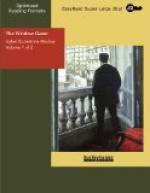Five days—four—three—two—a day and a half—the vastness of the spaces over which it must carry him grew endless as his mind continually tried to span them. He felt a distinct grievance that any country should be so wide.
“Making good time!” said a genial person, travelling in the tobacco trade. The professor eyed him with suspicion, as a man deranged by optimism.
The train crawled.
Spence removed his eyes from the passing landscape and tried to forget how slowly it was passing. He saw himself at the end of his journey. He saw Desire. He saw a grudging moment, or second perhaps, devoted to explanation. And then—How happy they were going to be! (If the train would only forget to stop at stations it might get somewhere.) How wonderful it would be to feel the empty world grow full again! To raise one’s eyes, just casually, and to see—Desire. To speak, in just one’s ordinary voice, and to know she heard. To stretch out one’s hand and feel that she was there. (What were they doing now? Putting on more cars? Outrageous!) He would even write that book presently, when he got around to it. (When one felt sure one could write.) But first they would go away, just he and she, east of the sun and west of the moon. They would sit together somewhere, as they used to sit on the sun-warmed grass at Friendly Bay, and say nothing at all. . . . How nearly they had missed it . . . but it would be all right now. Love, whom they had both denied, had both given and forgiven. It would be all right, it must be all right, now! (But how the train crawled.)
Poor John, poor old Bones! What a blow it had been for him. Although he should certainly have had more sense than to fancy—Well, of course, a man can fancy anything it he wants it badly enough. Spence was honestly sorry for John—that is, he would be when he had time to consider John’s case. But John, too, would be all right presently. (Why under heaven do trains need to wait ten minutes while silly people walk on platforms without hats?) John would marry a nice girl. Not a girl like Desire—not that type of girl at all. Someone quite different, but nice. A fair girl, like that nurse he had had in his office. John might be very happy with a wife like that . . .
* * * * * * *
It was not until the fourth night out that the professor remembered the packet from Li Ho. It had loomed so small among the events of that day of revelations that he had completely forgotten it. He did not even remember putting it in his pocket—but there it was, still unopened, and promising some slight distraction from the wearying contemplation of the crawling train. It would shut out, too, the annoyance of the tobacco traveller, smoking with an offensive leisureliness, and declaring, in defiance of all feeling, that they were “Sharp on time and going some!”
With a reviving interest in something outside the time-table, Spence cut the string and opened the yellow packet. A small note-book fell out and a letter—two letters, and one of them in the unmistakable writing of Li Ho him-self. This latter, the professor opened first.




